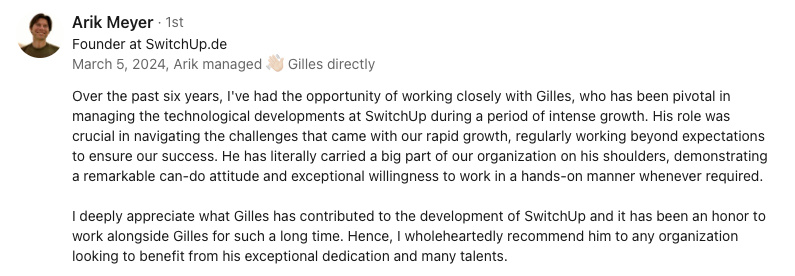Abstract:
The article discusses the challenges and opportunities that European tech startups face when navigating regulations like GDPR for data protection and PSD2 for financial transactions. These regulations, while stringent, encourage startups to prioritize privacy and security, which can be integrated into product design from the outset. This proactive approach not only ensures compliance but also aids in building customer trust and facilitating smoother market entry. Ruby on Rails is highlighted as a valuable tool for startups, offering built-in data protection features and community-supported gems that simplify compliance while fostering innovation. Real-world examples from fintech and healthcare, such as Revolut and Qure.ai, demonstrate how compliance can be leveraged as a competitive advantage without stifling innovation. The Rails ecosystem, with its robust community support, further empowers startups to seamlessly align with regulatory standards, transforming potential hurdles into pathways for growth and success in the European market.
Navigating the regulatory landscape in Europe can be challenging for tech startups. With regulations like GDPR for data protection and PSD2 for financial transactions, startups must ensure compliance without stifling innovation. These regulations safeguard data and encourage companies to prioritize privacy and security in their operations. For anyone entering the fintech or tech sector, understanding these rules is essential, as they affect everything from product development to market entry. Balancing innovation while adhering to strict rules can be tricky, but it also presents opportunities for growth and building customer trust. Let's explore how startups can tackle these challenges and turn compliance into an advantage.
Navigating Europe's Regulatory Maze
Understanding the Complex Landscape
In the European tech startup world, familiarity with key regulations like GDPR and PSD2 is crucial. GDPR sets high standards for data protection, transforming how startups handle personal data. It requires companies to prioritize privacy and secure data processes. For startups, adhering to GDPR is essential, as non-compliance can lead to significant legal issues.
Regarding financial regulations, PSD2 is vital for fintech companies. It mandates strong customer authentication for payments, emphasizing data security. While PSD2 may seem like a hurdle, it also drives innovation in fintech, encouraging companies to rethink security and customer interaction. This reflects broader impacts on financial technology.
To align more closely with the principles of 'convention over configuration' and 'rapid development,' Ruby on Rails (RoR) offers a framework that simplifies compliance integration, allowing startups to focus on innovation without getting bogged down by complex configurations.
Impact on Product Innovation
These regulations significantly influence product development. GDPR and PSD2 require a privacy-by-design approach, prompting startups to build compliance into their products from the outset. This proactive strategy not only meets legal standards but also prevents costly redesigns later. Incorporating compliance into product design can lead to smoother and more successful market launches.
Compliance also shapes market entry strategies. For growing startups, adhering to regulations can be a competitive advantage, facilitating quick market scaling and fostering strong customer trust. Successfully navigating these rules helps startups expand across borders, using compliance as part of their strategy. Understanding these dynamics is crucial for startups aiming to thrive in the European market.
Rails' Compliance-Friendly Features
Built-in Data Protection
In web development, securing data is essential. Ruby on Rails offers tools like ActiveSupport::MessageEncryptor to encrypt personal data, ensuring it's safe from unauthorized access. This is crucial for meeting data protection standards like GDPR. Rails' encryption features help startups integrate compliance into their software's core. Beyond encryption, effective data storage is vital for compliance.
Rails supports secure data storage practices that align with GDPR. With ActiveRecord encryption in Rails 7, developers can encrypt database columns, adding security for sensitive data. Rails also supports secure database configurations, such as SSL connections, protecting data in transit and at rest. These features meet compliance needs and build customer trust by demonstrating a commitment to data safety.
Rails' logging tools, like Rails Logger, ensure privacy by excluding personal data from logs. This helps maintain data privacy and adhere to regulatory standards. By managing logged information carefully, companies can prevent accidental data leaks. This focus on privacy helps startups align with GDPR's logging requirements.
Access and Authentication
Authentication and access control are key to data security in applications, and Rails provides strong solutions here. Using gems like Devise, developers can easily add user authentication, controlling access to sensitive data. This is important for meeting regulatory needs, impacting how user data is accessed and managed. By using Devise and other tools, companies can boost security and support their compliance strategy.
Harnessing the Power of Community Gems
Data Anonymization and Consent
Community-created Ruby gems offer excellent solutions for startups aiming to comply with regulations like GDPR. Gems like Cloak and DataAnon assist with data anonymization, aligning with GDPR's data minimization principles. This reduces the risk of data breaches, allowing startups to focus on innovation without worrying about fines.
Managing user consent is another crucial aspect of GDPR compliance. Gems like GDPR Consent and Termly simplify obtaining and documenting user consent. They make compliance straightforward and enhance user trust by ensuring consent is clear and transparent. These gems help startups operate smoothly and minimize legal risks.
To better address the persona's preference for local context and actionable insights, startups can explore region-specific gems and community resources that cater to local regulatory nuances.
Transaction Security
In financial transactions, especially in fintech, security is crucial. Gems like ActiveMerchant simplify secure payment processing, aligning with PCI-DSS standards. They ensure payment data is handled safely, supporting PSD2 compliance. This gem provides tools for building robust transaction systems, vital for customer trust in a competitive market.
By effectively managing transaction security, startups can focus on growth without being bogged down by security concerns. Using these tools facilitates innovation while meeting strict regulatory standards, offering a strategic advantage in fintech.
Real-world Regulatory Triumphs
Fintech Success Stories
In fintech, startups like Revolut demonstrate how Ruby on Rails can bridge the gap between compliance and innovation. Revolut navigated European regulations, like PSD2, using Rails' security features to meet requirements. This integration of compliance doesn't stifle innovation but enhances it, maintaining Revolut's competitive edge while keeping customer data secure. This example highlights the struggles and triumphs of fintech startups, showing how Rails can uphold standards without losing their innovative spirit.
Healthcare and Data Privacy
In healthcare, data privacy is crucial, and Qure.ai's approach is a prime example of using Rails for GDPR compliance. Qure.ai employs Rails' data protection features, essential for managing healthcare data. By using strong encryption and access controls, Qure.ai keeps patient data private and secure, meeting GDPR's requirements. Rails simplifies managing sensitive health information, allowing Qure.ai to focus on delivering innovative healthcare solutions. This use of Rails safeguards data and reinforces trust among users.
Balancing Compliance and Innovation
Strategies for Agile Compliance
Early integration strategies are key to balancing compliance with innovation. Here are some strategies:
- Automated Testing: Implement automated compliance testing to ensure high code quality without slowing development.
- Continuous Integration Tools: Use these tools to boost compliance and development speed, crucial for staying competitive.
- Proactive Design: Embed compliance considerations in product development to prevent costly redesigns later.
The Rails community supports integrating compliance early in development. Embedding compliance considerations in product development turns compliance from a hurdle into a stepping stone, allowing companies to move quickly while staying within rules. Early integration ensures startups can adapt as regulations evolve, maintaining their competitive edge.
Rails Ecosystem Support
The Rails community is a strong ally for startups wanting to stay compliant and innovative. Regular updates and a thriving community keep Rails aligned with legal standards, offering a framework for developing applications that meet regulatory and business needs. This collective effort gives startups an advantage, as they can rely on community insights to navigate regulatory changes.
For startups, the strength of the Rails ecosystem is not just in the framework but in the community around it. Ongoing support and shared knowledge mean developers are never alone in their compliance journey. Whether through forums, code repositories, or events, the Rails ecosystem provides resources to build innovative and compliant solutions. This support lets startups focus on innovation, backed by a framework designed for both regulatory and user demands.
Embracing Europe's regulatory landscape can be a growth catalyst in tech. By integrating GDPR and PSD2 compliance into a startup's core, you ensure legal adherence and build customer trust. This approach can set your products apart, turning challenges into strategic advantages. Ruby on Rails, with its strong data protection features, offers a framework to meet these demands efficiently. Tools like ActiveSupport::MessageEncryptor and community gems simplify compliance while fostering innovation. How can these insights enhance your startup's journey?
You might be interested by these articles:
- Rails 6: Revolution in Web Dev Scalability
- Ruby on Rails Security Best Practices
- Mastering Ruby on Rails for Modern Web Apps





